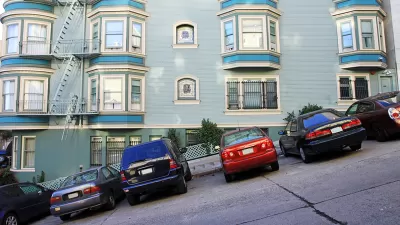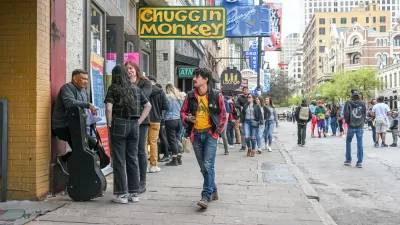Thanks to the elimination of minimum parking requirements downtown, a vacant one-story building "could be transformed into a 30-story tower with 135 luxury apartments, office space, a restaurant and a bar," reports the Austin-American Statesman.
Recently there have been reports showing that millennials are no different than preceding generations in that that they prefer suburbia over living in cities and would own cars if they could afford them, thus it's reassuring to read about urban developments that dispel those findings, particularly in Texas. Unlike a study, Congress Development Partners Ltd., has purchased a property to house carless millennials (or any other age group) who do indeed want to live downtown.
"The project — called The Avenue — won’t include a parking garage or any space for auto parking," writes Shonda Novak, Austin American-Statesman real estate reporter.
It is being billed by its developers as the first “truly car-free luxury development in downtown Austin,” designed to encourage biking, walking, ride-sharing and public transportation.
Richard Suttle Jr., an Austin attorney representing the developers in the city review process, said the demographic the project is targeting — people who live and work downtown — is on the rise.
“They move into this project knowing that there won’t be a place for a car,” Suttle said. “There are a lot of people living downtown now that don’t have a car. The downtown workforce is getting younger, and the younger generation is moving away from having to have a car. There is a (bike rental) facility adjacent to this site, and it will probably expand.”
The zoning change to eliminate downtown parking requirements was initiated on April 26, 2012, when the "City Council passed a resolution directing staff to develop an ordinance to reduce or eliminate minimum parking space requirements in the Central Business District and Downtown Mixed Use District." [Ordinance Amendment Review Sheet (MS Doc)].
"Supporters of the move say the minimum requirement has caused a parking surplus downtown, encouraging people to use their cars rather than bikes, buses and rail," wrote Austin American-Statesman transportation reporter Ben Wear on Dec. 12, 2012.
Take away that requirement, they say, and eventually garage parking will become a more scarce (and expensive) resource, encouraging people to use alternative transportation.
Financing
"Nelsen said developers hope to break ground by May 1, 2017," writes Novak.
The project is expected to take two years to build. Brad Nelsen [President of Nelsen Partners, which has offices in Austin and Scottsdale, Ariz.], said his team is still working to secure financing for the project, which he estimates will cost $55 million to $60 million.
It will be interesting to see if financing is secured. It's been said that the lending industry is wary of developments providing what they believe to be insufficient parking.
"In many parts of America, efforts to build transit-oriented, walkable communities are foiled because financing can't be secured for projects that differ from the templates lenders have become used to since World War II," wrote Noah Kazis for Streetsblog in 2010.
In Salt Lake City, for example, the local government's push for transit-oriented development has been stymied because local banks won't lend to projects without huge parking lots.
The apartments
"The planned high-rise would have apartments ranging from 420 square feet to 970 square feet with efficient designs to allow people to live comfortably in a smaller footprint, Brad Nelsen said," writes Novak.
With their smaller size, units will have rents that are about 15 percent lower than the going rate downtown, where a one-bedroom can range from $2,100 a month to $2,300 a month, the developers said
Plenty of transportation options allow for car-free living in downtown Austin.
“Our transit system is more robust than it has been in the past, and there are more options today for on-demand transit such as Car2Go, Uber and Lyft and B-Cycle,” said Jerry Rusthoven in the city’s Planning and Zoning Department.
Correspondent's note: Article reprinted here by American Planning Association.
Hat tip to Len Conly, Sierra Club transportation forum.
FULL STORY: 30-story ‘car-free’ apartment tower planned on Congress Avenue

Alabama: Trump Terminates Settlements for Black Communities Harmed By Raw Sewage
Trump deemed the landmark civil rights agreement “illegal DEI and environmental justice policy.”

Planetizen Federal Action Tracker
A weekly monitor of how Trump’s orders and actions are impacting planners and planning in America.

The 120 Year Old Tiny Home Villages That Sheltered San Francisco’s Earthquake Refugees
More than a century ago, San Francisco mobilized to house thousands of residents displaced by the 1906 earthquake. Could their strategy offer a model for the present?

San Francisco Opens Park on Former Great Highway
The Sunset Dunes park’s grand opening attracted both fans and detractors.

Oregon Legislature to Consider Transit Funding Laws
One proposal would increase the state’s payroll tax by .08% to fund transit agencies and expand service.

Housing Vouchers as a Key Piece of Houston’s Housing Strategy
The Houston Housing Authority supports 19,000 households through the housing voucher program.
Urban Design for Planners 1: Software Tools
This six-course series explores essential urban design concepts using open source software and equips planners with the tools they need to participate fully in the urban design process.
Planning for Universal Design
Learn the tools for implementing Universal Design in planning regulations.
Clanton & Associates, Inc.
Jessamine County Fiscal Court
Institute for Housing and Urban Development Studies (IHS)
City of Grandview
Harvard GSD Executive Education
Toledo-Lucas County Plan Commissions
Salt Lake City
NYU Wagner Graduate School of Public Service





























